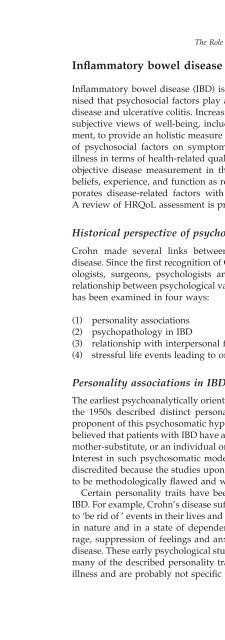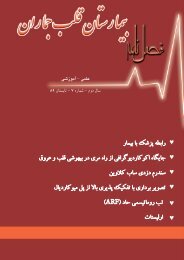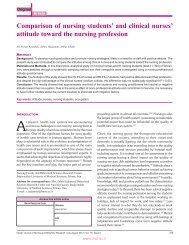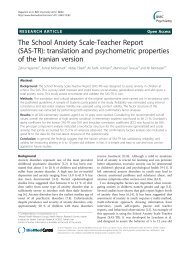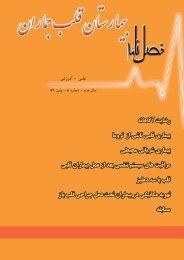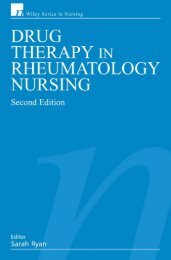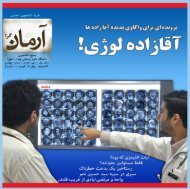Gastrointestinal Nursing.pdf
Gastrointestinal Nursing.pdf
Gastrointestinal Nursing.pdf
Create successful ePaper yourself
Turn your PDF publications into a flip-book with our unique Google optimized e-Paper software.
Inflammatory bowel diseaseThe Role of Psychosocial Factors in Gastroenterology 169Inflammatory bowel disease (IBD) is reviewed in Chapter 6. It is well recognisedthat psychosocial factors play a major role in the morbidity of Crohn’sdisease and ulcerative colitis. Increasing attention is now paid to the patient’ssubjective views of well-being, including emotional and psychosocial assessment,to provide an holistic measure of disease severity. To evaluate the effectof psychosocial factors on symptoms in IBD it is essential to examine theillness in terms of health-related quality of life (HRQoL). HRQoL differs fromobjective disease measurement in that it evaluates the patient’s perception,beliefs, experience, and function as related to an illness or condition. It incorporatesdisease-related factors with sociocultural and psychosocial factors.A review of HRQoL assessment is provided in Chapter 14.Historical perspective of psychological influences in IBDCrohn made several links between psychological variables and Crohn’sdisease. Since the first recognition of Crohn’s disease in the 1930s, gastroenterologists,surgeons, psychologists and psychiatrists have striven to find arelationship between psychological variables and physical symptoms. This linkhas been examined in four ways:(1) personality associations(2) psychopathology in IBD(3) relationship with interpersonal factors(4) stressful life events leading to onset and exacerbation of IBDPersonality associations in IBDThe earliest psychoanalytically orientated psychosomatic studies conducted inthe 1950s described distinct personality traits linked to IBD. The principalproponent of this psychosomatic hypothesis during this period, George Engel,believed that patients with IBD have a symbiotic relationship with their mother,mother-substitute, or an individual on whom they are emotionally dependent.Interest in such psychosomatic models ebbed in the 1960s and they are nowdiscredited because the studies upon which they were developed were foundto be methodologically flawed and were subject to investigator bias.Certain personality traits have been shown to be present in patients withIBD. For example, Crohn’s disease sufferers were viewed as constantly wishingto ‘be rid of ’ events in their lives and were described as ‘obsessive compulsive’in nature and in a state of dependency. Personality traits such as repressedrage, suppression of feelings and anxiety are closely associated with Crohn’sdisease. These early psychological studies in IBD must be viewed with caution;many of the described personality traits are common in any chronic physicalillness and are probably not specific to IBD.


